Following on from an article in the conversation published in the UK and then in France, Dr Sean Beer was invited to join the Durham Community Good Food Network to present his ideas relating to “Climate Friendly Diets.” The group is a very diverse and interesting collection of people, representing a variety of organisations, undertaking some fantastic work.
Sean’s presentation was entitled “Be careful what you wish for or a world of unintended consequences” and focused on some of the challenges we face in trying to make our food supply chains truly more sustainable. Also presenting at the meeting was Emma Mould from Food Newcastle. Subsequent discussion was wide-ranging. In many situations the primary problem, above and beyond ideas of sustainability, is trying to ensure that basic foodstuffs are available to everyone at a reasonable price.
Tagged / public engagement
Engaging online: ESRC Festival of Social Science 2020
This is part of our series on using online environments and platforms in engaging public audiences with research. You can read more about how BU has adapted to online engagement over the past year in a previous post.
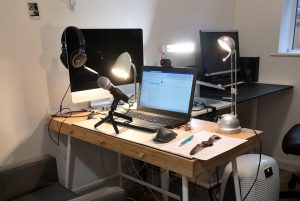
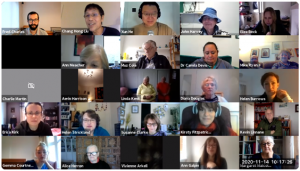
The ESRC Festival of Social Science is an annual celebration of the social sciences, offers a fascinating insight into some of the country’s leading social science research and how it influences our social, economic and political lives – both now and in the future. Bournemouth University is a partner of the Festival and has contributed events and activities every year since 2011. For researchers, the Festival is a fantastic opportunity for funded support towards engaging specific audiences in research and generating research impact.
The Festival of November 2020 was unlike any other. When we began preparations in April 2020, no one knew what situation we would be in by the Festival week in November. Luckily, we requested that all applicants propose online events, events with an online backup plan, or activities that could still happen within restrictions. In response, our academics proposed an impressive variety of innovative events to share their research with public audiences. We whittled applications down and worked with the event leaders to support and develop their plans as we moved through the changing world of summer and autumn 2020.
In the end, this approach paid off well, the Festival was held as a digital-first event and we held five live online events and an online exhibition, engaging a wide variety of public audiences with our varied research.
▸ See what events took place
Picturing and voicing responsible online gambling
The stereotype of the problem gambler no longer holds true – digital connectivity means we are all now exposed to online gambling and the risk of addiction.
This virtual exhibition looks behind the scenes of the online gambling industry – discover how platforms use artificial intelligence, targeted advertising and behavioural science to keep gamblers hooked – and how you can avoid falling prey to these tools. We’ll also share the diverse stories and voices of those affected by online gambling, through specially commissioned works of art.
This online exhibition was established in 2019, but 2020 saw the addition of new material commissioned from another artist.
Reading the room: how your brain judges the mood of a crowd
From speaking in front of an audience to policing a riot, the human brain has to judge the mood of a crowd in an instant. We shared what the latest research methods, including virtual reality and human electroencephalography (EEG, which measures “brain waves”), can tell us about face perception provided opportunities to test your own abilities.
Female political leadership at a time of crisis
During the recent pandemic, female political leaders have received widespread praise for their handling of this crisis. New Zealand PM Jacinda Ardern has been lauded as the figurehead of empathetic leadership, Nicola Sturgeon’s measured approach to the crisis has earned her praise from the news media, and Taiwan’s leader, Tsai Ing-wen has kept deaths from Covid-19 in single figures. Female leaders have challenged stereotypes of strong leadership and how we think and feel about women in positions of authority.
This discussion focused on how women in positions of political leadership make us feel in our anxious times. With attention to intersectionality, it combined presentations from experts on the psychodynamics of female political leadership, with a reflective group discussion led by a psychotherapist, to explore how social, psychological and political factors interact to shape attitudes and feelings about gender and political leadership at times of social and political crisis.
Dorset Unlocked: Special spots of Dorset for heritage and nature
This open chat with experts in archaeology, heritage and ecology looked at why getting out into the special spots that Dorset has to offer means so much to us. Together with students, they chose a few of their favourite places.
Professional decision making in health and social care
This interactive workshop explored how social care professionals at different stages of their careers make decisions regarding people who are unable to make their own decisions – due to their mental capacity, developmental stage or substance use. These are high stakes and complex decisions often made in conditions of uncertainty where risk to an individual’s health and wellbeing is a significant concern.
Using decision-making games, simulations and experiments, the participants explored the processes of decision making.
Comics and COVID-19: Communicating Public Health and Wellbeing
From the fear of getting sick to the chaos of working at home, from the struggles of full-time parenting to the threat of economic upheaval, this brief masterclass looked at how recent data comics on COVID-19 explore the complexities and potential of presenting data in more humanising ways.
Despite having developed skills in online teaching for several months, our event organisers’ plans challenged them to new levels in hosting their online events. All of the events juggled multiple contributors and presentations, some using video and interactive engagement tools. These elements provided a lot to consider, as event organiser Dr Xun He described in a blog post;
“This was the first public event I did online. To be honest, I was a bit anxious because there could be so many potential technical glitches during the event, not to mention that it would feel so different without being able to talk face-to-face to the audience in this unusual time. There were also technical considerations to take on board to run an engaging public event.”
Paying attention to the details of how you present yourself on video can often be an afterthought, so it was impressive to see how event holders handled multiple high-quality webcams, microphones and lighting to provide to provide the clearest link between themselves and their audience as they shared their research.
Despite online events providing unique difficulties and opportunities, it is important that these do not distract from the principles of high quality public engagement with research. We supported event-holders to be clear on what they wanted to achieve with their events, the audience they wanted to engage with and the best methods for doing so. In addition, our academics evaluated how the audience engaged with their research through observation, small group discussions, polls, quizzes, surveys and note boards such as padlet.
Once again, it is difficult to know for sure what the ESRC Festival of Social Science 2021 will look like – what restrictions we may be working within and what new opportunities may be presented. Our call for proposals will launch soon (watch this blog and the Public Engagement with Research Network for updates) and I’m looking forward to seeing the innovative plans developed by BU to share our diverse and fascinating research.
Engaging online: a research film premiere and Q&A
This is part of our series on using online environments and platforms in engaging public audiences with research. You can read more about how BU has adapted to online engagement over the past year in a previous post.
Below, Dr Oliver Gingrich describes running an online engagement event, the logistics and support received from BU’s Public Engagement with Research (PER) team – and most importantly, the impact of sharing research.
Oliver also spoke at a recent meeting of the BU Public Engagement with Research Network and has shared slides from the presentation.
My experience running an online event – KIMA: Noise
For me, as for many others, the new realities in the early days of the Covid-19 health crisis resulted in all new challenges in continuing research practice and dissemination. To help tackle these challenges I thought I’d share our experience developing and running an online event earlier this year, in case you find it useful.
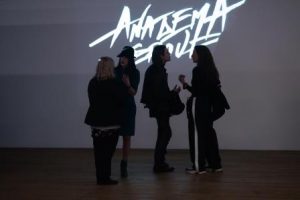
KIMA: Noise by Analema Group. Tate Modern 2019. www.analemagroup.com Image by Sophie le Roux. www.sophielerouxdocu.com
I am a researcher and creative practitioner, and artist with the collective Analema Group, recipients of an Arts Council England project grant for the art and research project KIMA Noise; an investigation into the effect of urban noise on health and wellbeing that we conducted for over three years with one of the leading experts in the field Prof. Stephen Stansfeld (Queen Mary University of London). Over the years Prof. Stansfeld has worked on the effect of noise specifically on learning and spearheaded the European Network on Noise and Health (ENNAH) and is currently working on a RANCH study on the effect of air traffic noise across 4 different countries. The Analema Group is a collective of four people founded by my colleague, the artist Evgenia Emets, Dr. Alain Renaud (Research Fellow at Bournemouth University) and the visual developer David Negrao.
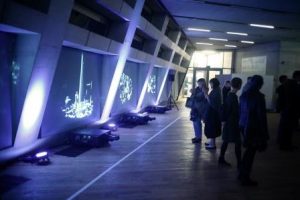
KIMA: Noise by Analema Group. Tate Modern 2019. www.analemagroup.com Image by Sophie le Roux. www.sophielerouxdocu.com
With the Analema Group, we were looking at effective strategies to communicate the known impact of noise on health to wider audiences, including local communities. Having been appointed Tate Exchange Associate, we brought this project to Tate Modern, with support of the Arts Council, resulting in several installations, talks, workshops, the publication of a monograph and ultimately a film. The success of the exhibition, talks and workshops not only transcended through the audience numbers, visitors and participants, but moreover the type of discussions we were able to have with local communities, policymakers, and other artists and activists. The art film KIMA: Noise captured this effort, but with the unprecedented challenges of Covid-19 we needed to find new ways to present this work to the public.
Thanks to Adam Morris and Brian McNulty from Bournemouth University’s world-class Knowledge Exchange & Impact Team (KEIT), we were able to communicate these research outputs to a wider public including BU’s academics: Initially being unfamiliar with the logistics of organising an online screening, I was more than grateful for the handholding and support by Adam in promoting and positioning the screening of the art film, but also for his and his team’s support in orchestrating the event. In the case of our event, online literally meant connected, as speakers from 3 countries (The UK, Portugal and Switzerland) came together.
At the screening of ‘KIMA: Noise – The Film’, we were honoured to welcome Prof. Stansfeld as one of our panelists, as well as Camilla Yavas (Film maker), Paola D’Albore (community engagement), Evgenia Emets (artist) and myself as researcher. The success of the event was highlighted through the wide networks we were able to activate including researchers at Bournemouth, interested artists, activists, and the wider BCP publics. The initial world premiere of the film via Bournemouth University was followed by a vibrant Q&A and discussion on the effect of noise on health and wellbeing that worked as well online as it would have in the space of the Tate. Thanks to the success of this world premiere, the film has since been seen by hundreds of people, with further screenings being planned nationally and internationally. The big benefit of an online event is that audiences and speakers can come together from all corners of the world, and the barrier to entry is so low, which makes it much easier to reach a critical mass. I want to express my sincere feelings of gratitude to BU’s outstanding Public Engagement team, who held our hand every step of the way, and assured the success of KIMA: Noise.
More information on the project can be found here:
https://www.tate.org.uk/whats-on/tate-modern/tate-exchange/workshop/kima-noise
https://analemagroup.com/projects/kima-noise-at-tate-exchange/
Watch the Film here: https://www.youtube.com/watch?v=NIXo5xt0_pw&t=32s
We can help promote your public engagement event or activity
At BU we promote and celebrate the work done to engage public audiences with BU research.
The public engagement with research team in Research Development and Support (RDS) can help promote your event to relevant audiences through our regular newsletter and social media channels. It also helps us to stay informed on the public engagement work being carried out by BU.

Please note: we are keen to promote BU public engagement with research activity wherever possible, but completing this form does not guarantee that we will be able to promote your event. To be considered for inclusion, your event or activity must be;
- Focused on BU research, either solely or as part of a wider programme.
- Events or activities that do not involve BU research, such as marketing or recruitment events, will not be accepted.
- Intended for and open to non-academic audiences, either entirely or as a portion of the audience.
- Submitted, at the latest, in the first two weeks of the month preceding the event.
- For example, an event taking place in June should be submitted via the form any time before 14 May. This is due to lead times on producing and sending the newsletter.
Event descriptions may be edited for consistency in style with other content. If you have any questions about this process, please contact us.
We will re-share this form once a month.
Engaging online: Café Scientifique
This is part of our series on using online environments and platforms in engaging public audiences with research. You can read more about how BU has adapted to online engagement over the past year in a previous post.
Café Scientifique is an international event format that hosts a talk from a researcher followed by plenty of time for questions and discussion, all in an informal and friendly environment.
For several years, Café Scientifique has been held in Boscombe’s Café Boscanova, a cosy café capable of holding 20 to 40 people at a push. Holding events in this space, privately opened for the evening and offering food and drink, encourages a laid-back and conversational atmosphere.
This posed a challenge when restrictions meant that gatherings and cafes were both off-limits. Since September 2020 we have held these events online, which has demonstrated the positives and negatives of online public engagement.
We’ve kept familiarity where possible, sticking to the same schedule of events held on the evening of the first Tuesday of every month (bar August and December). The events are hosted and promoted under the banner of BU, following the same format and with our regular host Dr Sharon Docherty.
We hold these events over Zoom allowing Sharon, our guest speaker and the audience to all see each other on video, and for the speaker to be able to present slides. Using the standard meeting platform does mean enforced muting of the audience though, to minimise additional noise.
With the ability to join from anywhere, and without the audience limit of a physical space, we’ve seen much higher attendance for our online events. Despite marketing these events only within the UK, we’ve welcomed attendees from around the world to hear about BU research and pose questions to our academics.
Our speaker for December 2020, Dr Sarah Elliott, shares some thoughts on the experience;
“I recently participated in Café Scientifique which, because of the current pandemic, has moved on-line. I think this is a great opportunity to be involved in and for viewers across the country to engage in scientific research.
Academics spend a lot of time presenting their research to each other and publishing their data, but through Café Sci as a platform you are able to reach a wider audience and facilitate discussions about your research in an informal and friendly environment.
The event had a good turn out and very positive feedback, the questions asked in the discussion were all thought provoking and important points were highlighted upon which I could expand my explanations. Academics always have so much to say, and not enough time to say it, so the ample time given for discussion at a Café Sci event provides a real opportunity to focus on the aspects of the talk which the public were most interested in.”
You can read more about Sarah’s experience in this blog post.
Hosting these events online has also made them easy to record, where guest academics chose to do so, and so we are able to share past events through our YouTube channel.
Catch up on other Café Scientifique events.
Translating Café Scientifique online didn’t all go as expected, though. To begin with, we tried as much as possible to encourage the same convivial, conversational atmosphere as in-person events, inviting audience members to chat amongst themselves in the chat section and ask their questions live over video. However, we soon found that attendees were generally reluctant to talk on video in front of a large virtual audience and asked instead that questions be posted in the chat, where host Sharon could read them to our speaker.
This encapsulates the importance of challenging your assumptions about engaging online and being willing to adapt. While there are certainly advantages to be had in audience size, diversity and types of accessibility, it can be difficult to foster a sense of interpersonal connection. Whether this is a relevant factor will vary between projects.
Despite the advantages we’ve seen with holding Café Scientifique online, we plan to resume in-person events when possible, as the café atmosphere and surroundings are the essence of what makes the format special. However, the experience of holding these events online has been, and will continue to be valuable in advising on activities that thrive in an online environment.
Engaging online: a year of online public engagement with research
There’s no doubt that the past year has presented a huge challenge to public engagement with research, but it’s one to which the BU research community has risen brilliantly.
With an increased national awareness of the role HEIs play in research, and vice versa, comes a stronger imperative to engage public audiences in the exciting research carried out at BU. In a series of posts this week we’ll be taking a refreshed look at public engagement with research in the context of the past year, some inspirational examples of projects by BU academics and advice on how to develop public engagement work.
Engaging online
The start of restrictions on events last year saw a mass pivot to online engagement with research, adapting familiar formats for online delivery and developing new techniques too.
We’ll take a closer look at some of these examples in future posts, but here’s just a flavour of the activities carried out over the past year to engage the public in research;
- Café Scientifique has been held online since September last year, drawing in record numbers from around the globe. Find out more about how we’ve delivered these events online and an academic’s experience of being involved.
- Dr Oliver Gingrich; researcher, creative practitioner, and artist with the collective Analema Group, held an online research film premiere and Q&A on urban noise and wellbeing. Oliver’s experiences and advice are covered in more detail in another post.
- The ESRC Festival of Social Science 2020 was held almost entirely online across the national festival. BU held five live online events, as well as an online exhibition, covering topics as diverse as online gambling, communicating public health data, visual perception, social care decisions, Dorset heritage and nature, and female political leadership. Take a closer look at these events in another post.
- Dr Catalin Brylla screened his film on blindness, wellbeing and stigma in the virtual world of Second Life, where his public group have their own ‘island’.
- The Ageing and Dementia Research Centre hosted informal coffee mornings to chat about their research and empower relevant audiences to feed back on ongoing and future research.
- Dr Sarah Collard shared interviews, personal experience and hosted discussion on the topic of exercising with epilepsy.
- The Department of Life and Environmental Sciences (LES) translated their fledgling Family Science Festival to an online format, and were invited by leading environmental science funder NERC to share their experience.
- The SURE 2021 conference highlighted excellent research from over 100 undergraduates in a full day conference for audiences inside and outside of BU.
The future of online engagement
It has been really impressive to see how academics have adapted and reformulated their plans for public engagement with research. We’ve seen people use this situation as an opportunity to refresh their thinking and explore the opportunities presented by online engagement, rather than be limited by it. There are a number of advantages that mean it should remain an option to consider;
- Online engagement with research is more accessible for many people and can reach entirely new audiences as a result
- It is often cheaper, avoiding venue, travel and catering costs
- Being open to attendees at a national or international level means your audience can be very specific, but much larger than a local event. In the right context, this can be an effective pathway to achieving research impact.
However, we can’t just move everything online and call it a success. There are potential downsides to engaging online that can vary depending on your context;
- Increased accessibility for some means decreased accessibility for others; limited IT skills, confidence and equipment exclude many from joining
- It is more difficult to foster a sense of interpersonal connection when engaging online, compared to in-person experiences
Looking ahead, we need to find a balanced approach, in which online engagement is just one highly effective option among many others that might work for engaging the public with research. Later this week we’ll look at what support is available at BU for developing strategies and activities to engage the public in research.
Cafe Scientifique – Tuesday 4 May: Are the world’s ecosystems about to collapse?
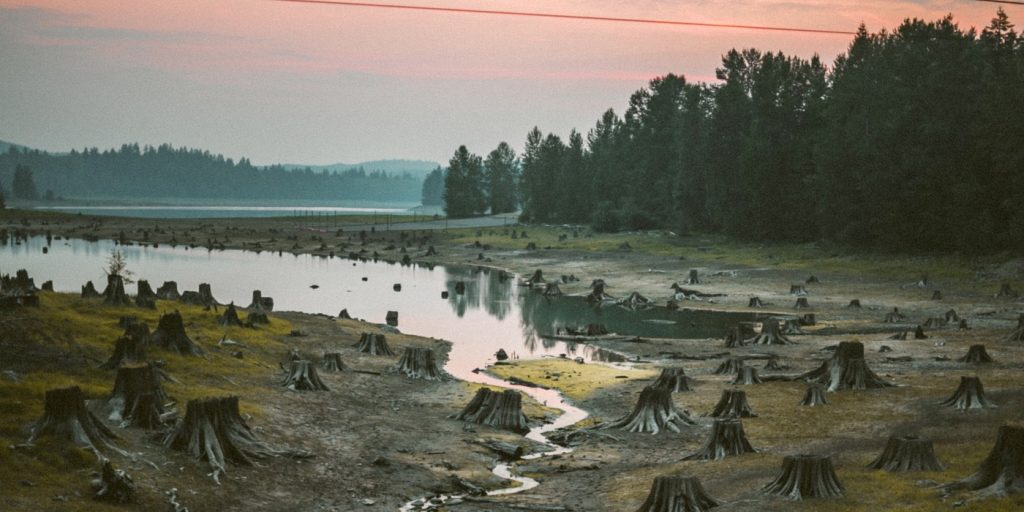
At Café Scientifique, you can explore the latest ideas in science and technology in a relaxed online setting. Enjoy listening to a short talk before engaging in debate and discussion with our guest speaker and audience.
We’ll be joined by Professor Adrian Newton on Tuesday 4 May, from 7.00pm until 8:30pm.
Figures including David Attenborough and Greta Thunberg have recently drawn attention to the risks of ecosystem collapse. But what do we know about this process? What might cause an ecosystem to collapse, and what are the consequences? Join us to review our current understanding of ecosystem collapse, and how it relates to subsequent ecological recovery, drawing on examples from throughout Earth’s history.
Attendance is free but booking is necessary.

BU undergrads present at National BCUR 2021 Conference hosted by University of Leeds
Last week during the Easter break close to twenty BU students across all 4 faculties took part in the virtual version of the British Conference for Undergraduate Research (BCUR) hosted by the University of Leeds on April 12-13. Last year’s event was cancelled so those due to attend last year along with new BU registrations meant that a bigger number of students could take part this year. It was a very full programme with over 600 participating over the 2 days. Students presented their research along with taking in keynote addresses, online socials including murder mysteries, a welcome event and PhD info sessions. Abbie Williams, a BA (Hons) Sports Psychology and Coaching Sciences 2020 graduate who did a presentation on ‘Investigating Coaches’ and Practitioners’ Experiences of Performance Blocks in Sport’ found participating worthwhile: “I learned so much – overall I thought it was great and I really enjoyed presenting as well”.
Will Priddis is a BA (Hons) Film student and did a presentation on ‘Shooting the Stage: Using filmmaking techniques to enhance the recording of live theatre’. He shared: “It was really nice to see so many presentations from so many disciplines…I presented about media but had a really fun time attending some great maths and physics presentations too. It was really nice to connect with some like-minded people in that sense”.
SciTech student Morven Smith BSc (Hons) Biological Sciences presented on ‘Assessing Dominance Hierarchies and Food Preferences in Garden Birds’. She shares these observations: “I had a really really fantastic time at BCUR, I feel like it was such a good experience and definitely made me work on my presentation and public speaking skills. Which is an opportunity I never would’ve had if I hadn’t put myself out my comfort zone a little bit!”
And Amy Preece, BSc (Hons) Mental Health Nursing presented on ‘What are the Impacts of Drama-based interventions when used in Forensic Settings?’ She provides this feedback: “BCUR was a really positive experience. It further piqued my interest for further education and made me consider future research career options for myself. The format worked well online, although I would have preferred a physical conference to attend. You’ll get out of it what you put in, and if you go in willing to listen and network you’ll be pleasantly surprised.
Finally, we can see in the image here Finlay Brown, a BA (Hons) Politics student has his session captivated with his presentation on ‘To What Extent has the dissemination of an anti-elite syle of populism affected public trust in a Covid-19 vaccination in the UK’.
Presentations and content presented by all BU students taking part can be found in the programme here. BU Students who get involved in SURE have the opportunity to be considered to take part in BCUR as well. Special thanks to all staff and faculties who have supported students to get involved in SURE and BCUR. Future hosts of the national conference include Warwick, Exeter and Newcastle.
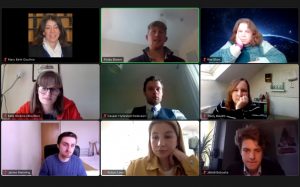
Public Engagement training from BU – getting started, creating a strategy and evaluating for impact
Free training sessions for BU staff on engaging the public in your research, as part of the RKEDF
High quality public engagement
Monday 26 April 2021
2.00 – 4.30pm
Online (Blackboard Collaborate)
This course will develop your public engagement skills to a high level. It is aimed at academics with some public engagement experience, and/or those who have completed the ‘Getting started in Public Engagement’ session. The course offers an opportunity to reflect on past public engagement work and plans for the future. In particular, we will focus on developing your own plans with guided feedback and discussion. This workshop will be delivered by expert trainers from the National Co-ordinating Centre for Public Engagement (NCCPE)
Aims of this workshop
- Explore frameworks and concepts that deepen thinking about People, Purpose and Process
- Apply those explorations to your own work
- Consider how to take the concepts into your own work in the future
How to book your place
- Complete this Approval Request email template and send it to your Head or Deputy Head of Department.
- Your HoD/DHoD can approve your registration session by forwarding the email to Organisational Development.
- You will be sent an Outlook Calendar meeting request to confirm your booking. This should be sent to you within 2 working days of receipt.
Getting started in public engagement with research
Online recorded session now available
Aims of this workshop
- This session aims to get academics from zero or little experience in public engagement with research (PER) to a position where they are confident carrying out PER activity with awareness of audience, delivery and evaluation.
How to watch
Watch the recorded session on Brightspace, delivered by Adam Morris, Engagement Officer at BU.
We can help promote your public engagement event or activity
At BU we promote and celebrate the work done to engage public audiences with BU research.
The public engagement with research team in Research Development and Support (RDS) can help promote your event to relevant audiences through our regular newsletter and social media channels. It also helps us to stay informed on the public engagement work being carried out by BU.

Please note: we are keen to promote BU public engagement with research activity wherever possible, but completing this form does not guarantee that we will be able to promote your event. To be considered for inclusion, your event or activity must be;
- Focused on BU research, either solely or as part of a wider programme.
- Events or activities that do not involve BU research, such as marketing or recruitment events, will not be accepted.
- Intended for and open to non-academic audiences, either entirely or as a portion of the audience.
- Submitted, at the latest, in the first two weeks of the month preceding the event.
- For example, an event taking place in June should be submitted via the form any time before 14 May. This is due to lead times on producing and sending the newsletter.
Event descriptions may be edited for consistency in style with other content. If you have any questions about this process, please contact us.
We will re-share this form once a month.
Standing up for Science workshop – Thursday 13 May

The next Standing up for Science online workshop is taking place on Thursday 13 May 09:30-13:00. Find out how to make your voice heard in public debates about science and evidence.
As part of the Voice of Young Science, a network of 4000+ of Early Career Researchers from across the UK and Europe, this workshop encourages early career researchers (ECRs) to make their voices heard in public debates about science. During this half-day event, ECRs meet scientists who have engaged with the media and learn from respected science journalists, hear from policymakers on how to inform policy and talk about involving the public in communicating research with public engagement experts.
A registration link will be sent to all successful applicants before the webinar.
Learn from researchers who have engaged with the media, and policymakers about why good evidence is important for them and how researchers can help to inform policy. Respected science journalists will talk about how the media works, how to respond and comment, and what journalists expect from scientists and researchers. Get hints and tips from communications experts on how you can start standing up for science, and find out how to involve the public in communicating research.
FREE for STEM and social science early career researchers, trainees and medical professionals.
Apply for your free place here
Application deadline: 5pm on Monday 19 April
For more details, email: Joshua Gascoyne at josh@senseaboutscience.org
Alternatively, please contact Adam Morris Engagement Officer publicengagement@bournemouth.ac.uk
Public Engagement training from BU – getting started, creating a strategy and evaluating for impact
Free training sessions for BU staff on engaging the public in your research, as part of the RKEDF.
Evaluation: developing your approach
Wednesday 21 April 2021
10.30am – 1.00pm
Online (Blackboard Collaborate)
This course will cover why evaluation is important, look at ways to get started, explore different techniques, and consider what your findings can tell you and your organisation or funder. We will also cover the ways in which evaluation can be used to generate evidence for impact. With an emphasis on how to conduct evaluation, join us for a programme of practical activities and discussion as together we demystify evaluation and find the fun in revealing and identifying your effectiveness. This workshop will be delivered by expert trainers from the National Co-ordinating Centre for Public Engagement (NCCPE).
▸ Aims of this workshop
- develop an awareness of the value and importance of evaluating public engagement.
- gain familiarity with the process of evaluation and the usefulness of planning.
- consider the uses of evaluation including improving activities; sharing good practice and reporting.
- begin to explore the issues and challenges of evaluating public engagement.
- continue to develop personal and professional skills, for example in communication, planning and critical reflection.
- increase confidence in evaluating public engagement activities.
- understand how evaluation ties in to impact
▸ How to book your place
- Complete this Approval Request email template and send it to your Head or Deputy Head of Department.
- Your HoD/DHoD can approve your registration session by forwarding the email to Organisational Development.
- You will be sent an Outlook Calendar meeting request to confirm your booking. This should be sent to you within 2 working days of receipt.
High quality public engagement
Monday 26 April 2021
2.00 – 4.30pm
Online (Blackboard Collaborate)
This course will develop your public engagement skills to a high level. It is aimed at academics with some public engagement experience, and/or those who have completed the ‘Getting started in Public Engagement’ session. The course offers an opportunity to reflect on past public engagement work and plans for the future. In particular, we will focus on developing your own plans with guided feedback and discussion. This workshop will be delivered by expert trainers from the National Co-ordinating Centre for Public Engagement (NCCPE).
▸ Aims of this workshop
- Explore frameworks and concepts that deepen thinking about People, Purpose and Process
- Apply those explorations to your own work
- Consider how to take the concepts into your own work in the future
▸ How to book your place
- Complete this Approval Request email template and send it to your Head or Deputy Head of Department.
- Your HoD/DHoD can approve your registration session by forwarding the email to Organisational Development.
- You will be sent an Outlook Calendar meeting request to confirm your booking. This should be sent to you within 2 working days of receipt.
Getting started in public engagement with research
Online recorded session now available
▸ Aims of this workshop
- This session aims to get academics from zero or little experience in public engagement with research (PER) to a position where they are confident carrying out PER activity with awareness of audience, delivery and evaluation.
▸ How to watch
- Watch the recorded session on Brightspace, delivered by Adam Morris, Engagement Officer at BU.
SIA Game-Changing Concept: Sustainable Storytelling for Science & Health
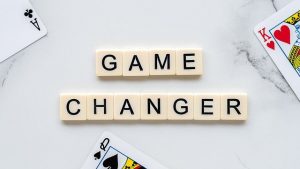 I invite you to join us in developing our proposal for Sustainable Storytelling for Science & Health as a game-changing concept supporting BU SIAs. In brief, we propose to explore and evaluate science and health communication through popular narrative across a variety of media and genres. How do popular narratives educate and influence behaviour, as well as entertaining us? How can we use these works to effect behaviour change in areas relevant to global challenges (such as the UN Sustainable Development Goals)?
I invite you to join us in developing our proposal for Sustainable Storytelling for Science & Health as a game-changing concept supporting BU SIAs. In brief, we propose to explore and evaluate science and health communication through popular narrative across a variety of media and genres. How do popular narratives educate and influence behaviour, as well as entertaining us? How can we use these works to effect behaviour change in areas relevant to global challenges (such as the UN Sustainable Development Goals)?
What do we mean by “science and health”? We’re taking a broad approach, so we want to be open to communication of all research conducted at BU, which includes humanities and social science as well! Current and proposed projects encompass sustainability, ecology, archaeology, heritage, public health, medical information, training, mental health and suicide, social care, media literacy, assistive tech, dementia, and more.
What do we mean by “popular narrative”? Play and narrative are fundamental learning techniques stretching back before written culture and formal education, and the public learns a great deal from the media they consume. Science communication scholars have been advocating for entertainment media producers to include authentic science in their work, so we think the converse carries merit: entertainment media with accurate and persuasive educational content can have positive benefits on audiences. Thus, we intend to explore science and health communication through prose, journalism, games, film, documentary, television, VR/AR, immersive experiences, interactive narratives, comics/graphics, performance, social media, and more.
Who are “we”? Aside from the royal we of me, we are a (growing!) team of researchers in communications, journalism, narrative, public health, health, ecology, behaviour, marketing, animation, digital humanities, performance, film, media, nursing, and more. I am leading the bid from my cross-faculty position in Health & Science Communication and the emerging Science, Health, and Data Communications Research Group, and I welcome co-investigators as well as team members.
Bournemouth University already has a plethora of experts and a strong foundation of projects in these areas across multiple faculties; this proposal would enable us to come together in a more formal manner to amplify our current work and foster new research collaborations. If you want to be involved but you’re not sure how your work/interests fit in, please feel free to contact me. If you’re sure you want to be involved, also contact me!
Café Scientifique this evening – Sweet Talk – how we feel about sweet foods, sweeteners and sugar

At Café Scientifique, you can explore the latest ideas in science and technology in a relaxed online setting. Enjoy listening to a short talk before engaging in debate and discussion with our guest speaker and audience.
We’ll be joined by Claudia Tang this Tuesday 6 April, from 7.00pm till 8:30pm.
Is sugar the enemy in your diet? What about sweet-tasting foods in general? The way we think about eating sugary foods can be affected by how we view the alternatives; eating low-calorie sweeteners or avoiding sweet foods altogether. BU researcher Claudia Tang asked the public how they feel about sugar, sugar alternatives and policies like the sugar tax. Join us to explore how we feel about sweet tastes, reveal common (mis)beliefs and discover how you can play a part in new research.
Attendance is free but booking is necessary.

Public Engagement training from BU – getting started, creating a strategy and evaluating for impact
Free training sessions for BU staff on engaging the public in your research, as part of the RKEDF.
Evaluation: developing your approach
Wednesday 21 April 2021
10.30am – 1.00pm
Online (Blackboard Collaborate)
This course will cover why evaluation is important, look at ways to get started, explore different techniques, and consider what your findings can tell you and your organisation or funder. We will also cover the ways in which evaluation can be used to generate evidence for impact. With an emphasis on how to conduct evaluation, join us for a programme of practical activities and discussion as together we demystify evaluation and find the fun in revealing and identifying your effectiveness. This workshop will be delivered by expert trainers from the National Co-ordinating Centre for Public Engagement (NCCPE).
▸ Aims of this workshop
- develop an awareness of the value and importance of evaluating public engagement.
- gain familiarity with the process of evaluation and the usefulness of planning.
- consider the uses of evaluation including improving activities; sharing good practice and reporting.
- begin to explore the issues and challenges of evaluating public engagement.
- continue to develop personal and professional skills, for example in communication, planning and critical reflection.
- increase confidence in evaluating public engagement activities.
- understand how evaluation ties in to impact
▸ How to book your place
- Complete this Approval Request email template and send it to your Head or Deputy Head of Department.
- Your HoD/DHoD can approve your registration session by forwarding the email to Organisational Development.
- You will be sent an Outlook Calendar meeting request to confirm your booking. This should be sent to you within 2 working days of receipt.
High quality public engagement
Monday 26 April 2021
2.00 – 4.30pm
Online (Blackboard Collaborate)
This course will develop your public engagement skills to a high level. It is aimed at academics with some public engagement experience, and/or those who have completed the ‘Getting started in Public Engagement’ session. The course offers an opportunity to reflect on past public engagement work and plans for the future. In particular, we will focus on developing your own plans with guided feedback and discussion. This workshop will be delivered by expert trainers from the National Co-ordinating Centre for Public Engagement (NCCPE).
▸ Aims of this workshop
- Explore frameworks and concepts that deepen thinking about People, Purpose and Process
- Apply those explorations to your own work
- Consider how to take the concepts into your own work in the future
▸ How to book your place
- Complete this Approval Request email template and send it to your Head or Deputy Head of Department.
- Your HoD/DHoD can approve your registration session by forwarding the email to Organisational Development.
- You will be sent an Outlook Calendar meeting request to confirm your booking. This should be sent to you within 2 working days of receipt.
Getting started in public engagement with research
Online recorded session now available
▸ Aims of this workshop
- This session aims to get academics from zero or little experience in public engagement with research (PER) to a position where they are confident carrying out PER activity with awareness of audience, delivery and evaluation.
▸ How to watch
- Watch the recorded session on Brightspace, delivered by Adam Morris, Engagement Officer at BU.
SURE 2021 highlights undergrad research excellence at BU
The SURE conference was held virtually this year on March 17th with well over 100 participating throughout the afternoon including undergraduates from all faculties, staff and family & friends of students presenting. There was a wide variety of work drawn from that ranged from eg the impacts of drama in forensic settings, how human behavior affects mass outbreaks, newspaper reporting on Communist ideology, and impact of Covid 19 on business conferences. Students were recognized in each faculty for the quality of their work, with Amazon vouchers being awarded to Finlay Brown and Yana Livena (FMC), Natasha Cox and David Cabrini Back (HSS), Fin Underhill and Anne Heim (FST) and Jana Sasstamoinen and Tom Dexter (BUBS). The Sustainability prize was awarded to Jack Sykes of FMC by Eleanor Wills BU Sustainability Support Officer. An overall prize winner of a Masters Fee Waiver was awarded to Tara Walker of FST on her commendable work on how educational professionals personally manage inclusion (see her reaction here). This virtual conference once again highlights the wonderful work BU undergrads are capable of.
Staff from all faculties chipped in to support the students by way of chairing the online channels (streams). Keynotes were delivered by our esteemed colleagues Isa Rega of FMC on digital storytelling and empowerment, and a join presentation from Dean Lois Farquharson and Samreen Ashraf of BUBS on the power of research skills and our adaptation to a changing world. Vice Chancellor John Vinney was also on hand to welcome students and commend their work.
The SURE planning committee for 2021 was made up of Mary Beth Gouthro and Fiona Cownie as co-Chairs, Faculty Reps Miguel Moital, Roya Haratian and Andrew M’manga. A special shout out to Rae Bell, Student Communications officer who was integral to its function and hosting on the day. Some SURE participants have had abstracts accepted for the national BCUR conference hosted by the University of Leeds on April 12-13 where 20 BU students will be showcasing their work from across our faculties. 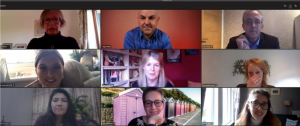
RKEDF: Research Training Events in March

RKEDF:
Research Training Events in March
The following training events are coming up this month. These are all online events. Please book now!
| Tuesday 9th March 10:30 – 13:00
High Quality Public Engagement This will develop your public engagement skills to help you to deliver excellence. |
| Tuesday 23rd March 10:00 – 13:00
Impact Planning Apologies – this is now cancelled. |
| Wednesday 24th February 09:00 – 11:00
Dealing with Rejection Professor Edwin van Teijlingen will share some practical hints and tips on how to constructively and effectively deal with a journal rejection. |
| Wednesday 24th February 12:00 – 13:00
AHRC Research, Development and Engagement Fellowships Information Session This is the theme for this week’s Funding Development Briefing. Contact ResearchDev@bournemouth.ac.uk to book. |
| Wednesday 24th February 15:00 – 16:00
Early Career Researchers Network Meeting The theme of this month’s network briefing is BU’s Strategic Investment Areas, and how Early Career Researchers can get involved. |
BOOKING: Unless otherwise stated, to book, please email OD@bournemouth.ac.uk with evidence of approval from your Head of Department or Deputy Head of Department.
You can see all the Organisational Development and Research Knowledge Development Framework (RKEDF) events in one place on the handy calendar of events.
If you have any queries, please get in touch!
We can help promote your public engagement event/ activity
At BU we promote and celebrate the work done to engage public audiences with BU research.
The public engagement with research team in Research Development and Support (RDS) can help promote your event to relevant audiences through our regular newsletter and social media channels. It also helps us to stay informed on the public engagement work being carried out by BU.

Please note: we are keen to promote BU public engagement with research activity wherever possible, but completing this form does not guarantee that we will be able to promote your event. To be considered for inclusion, your event or activity must be;
- Focused on BU research, either solely or as part of a wider programme.
- Events or activities that do not involve BU research, such as marketing or recruitment events, will not be accepted.
- Intended for and open to non-academic audiences, either entirely or as a portion of the audience.
- Submitted, at the latest, in the first two weeks of the month preceding the event.
- For example, an event taking place in June should be submitted via the form any time before 14 May. This is due to lead times on producing and sending the newsletter.
Event descriptions may be edited for consistency in style with other content. If you have any questions about this process, please contact us.
We will reshare this form once a month.











 Seeing the fruits of your labour in Bangladesh
Seeing the fruits of your labour in Bangladesh Exploring Embodied Research: Body Map Storytelling Workshop & Research Seminar
Exploring Embodied Research: Body Map Storytelling Workshop & Research Seminar Marking a Milestone: The Swash Channel Wreck Book Launch
Marking a Milestone: The Swash Channel Wreck Book Launch No access to BRIAN 5-6th February
No access to BRIAN 5-6th February ECR Funding Open Call: Research Culture & Community Grant – Application Deadline Friday 12 December
ECR Funding Open Call: Research Culture & Community Grant – Application Deadline Friday 12 December MSCA Postdoctoral Fellowships 2025 Call
MSCA Postdoctoral Fellowships 2025 Call ERC Advanced Grant 2025 Webinar
ERC Advanced Grant 2025 Webinar Update on UKRO services
Update on UKRO services European research project exploring use of ‘virtual twins’ to better manage metabolic associated fatty liver disease
European research project exploring use of ‘virtual twins’ to better manage metabolic associated fatty liver disease